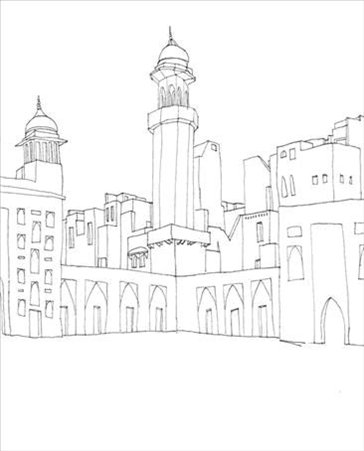
Pakistan held its Presidential elections on Saturday. While the results surprised few, Musharraf's ongoing constitutional ability to lead remains before the Supreme Court. It is not certain how much attention Musharraf will pay the lawyers - his entry into politics was never orthodox in the best democratic sense.
It was not the possibility of street protest that kept me out of the old town but the more prosaic difficulties of being a tourist during Ramadan. On Friday while wandering around Anarkali Bazaar I found a darkened shop where, behind a second door and screens, men sat and drank tea. The frisson, and relief, of a bottle of cold water was wonderful. It is remarkable how quickly disreputable activities become pleasurable and compelling.
I started drawing from the roof of a city building but the noise and heat, and exhortations to prayer from mosque and loudspeaker, made it more sensible to head home and wait till Eid next weekend when all returns more or less to normal.
There was also overdue miniature painting homework that needed many hours of slow and careful effort.
ASR held a weekend long workshop with community development delegates from all over Pakistan. The problems are profound.
Ramesh Kumar Jaipal works with Shudra or Dalit [scheduled] caste Hindus. They remained in Pakistan after Partition, partly through poverty, and partly because their position in Indian society was so bad that the new country, though Muslim, could be no worse. There are more than 350,000 in Rahim Yar Khan, and problems include access to health and education resources, active discrimination and lack of opportunity. Ramesh estimates that 98% do not own their homes, and rent from feudal landlords.
He is currently campaigning to open Hindu temples closed the last 30 years. You can see them on the skyline as you walk around Lahore but their street facades are lost, buried, behind shops and hoardings.